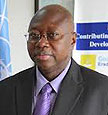Upholding principles of democracy
Today, the international community celebrates the “International Day of Democracy, 2013”, with the theme “Strengthening Voices for Democracy”.

Lamin Momodou Manneh
